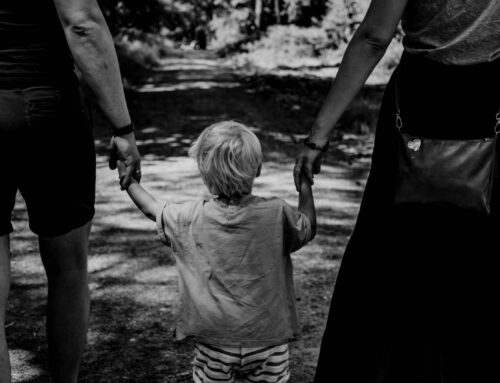by guest author Terry Gaspard
During and after divorce, it’s important for parents to adopt a positive mindset and learn ways to foster their children’s emotional well-being and resiliency. Most children have the capacity to adjust to their parents’ divorce and deal with the changes they’ll be faced with if they have sufficient support.
One of the key ways to support your children post-divorce is to model harmonious interactions with your former spouse so they can maintain a healthy bond with both parents. Your focus needs to be on modeling effective communication – boosting your children’s optimism about love and intimate relationships. Ask yourself: how do I want my children to remember me in the years to come?
All children, even those in intact homes, suffer emotional pain at times. Whether at home, in school, or in the neighborhood – children experience a wide range of emotions daily and they usually bounce back without permanent harm. Having an open dialogue with your kids and reminding them that you will always love them and are open to discussing anything on their mind (positive or negative) will provide a buffer to help them weather the storms of life.
According to author, Ken Barish Ph.D., many experiences (including parental divorce) can trigger a profound sense of shame in children. In Daring Greatly, Dr. Brené Brown informs us that shame is the intensely painful feeling or experience of believing we are flawed and therefore unworthy of acceptance or belonging.
Consequently, emotional injuries, just like physical ones, must be healed or the damaging effects of the triggering event – in this case divorce – will spread or get worse. In order to heal, children of divorce often benefit from counseling and/or a support group at their school or a community agency where they can share their feelings freely. This will help them understand that they’re not the cause of your divorce and they’re not alone – helping minimize their shame and boost their self-esteem.
Divorce expert Rosalind Sedacca, CDC, concludes that it’s important to be proactive when it comes to your child’s emotional well-being after divorce. She writes: “Don’t wait for emotional or behavior problems to appear. It is often wise to talk to a family therapist in advance about issues to be aware of. Or schedule a few sessions with your children so they can express their anxiety, fear, anger, etc. and feel “heard” by an objective third party. Ask friends, pediatricians or school professionals for referrals to therapists experienced with divorce.”
First and foremost, there are certain conditions that set the stage for healing after divorce. If these conditions are not met, or if your children in any way feel alienated from one of their parents, this could set the stage for more serious social, emotional, or psychological problems.
8 ways to help kids be happier and more resilient after divorce:
• Explain the separation or divorce to your kids. The overall theme of this discussion is to tell your kids about your divorce in a clear and blameless manner, and make sure they know they still have a family. Keep the door open for further discussion. Kids have an uncanny ability to avoid serious discussions when their parents want to talk, so make sure they know you’re waiting in the wings when they feel like chatting.
• Explain that your divorce is not their fault. This is a crucial message that needs to be repeated over and over again. Even if your children say they know it isn’t, most kids will succumb to these thoughts during times when they feel vulnerable or are dealing with transitions or stress.
• Respect for your children’s needs (not strictly wants); such as a need for routine, stability, love, and a sense of belongingness with both parents. Shared parenting or a parenting plan which ensures that your children have close to equal access to both parents (assuming your children feel safe with both) will help your kids feel secure. New research shows that joint or shared parenting actually reduces conflict between divorced parents.
• Don’t engage in conflict with your and ex or bad mouth him/her. Accept that your divorce impacted your children’s view of relationships and learn new ways of communication with your ex-spouse. Model self-control and being cordial with each other. Negative comments about your children’s other parent are likely to cause him/her to experience loyalty conflicts – which can lead to emotional pain and turmoil. Don’t grill them with questions about their other parent or make judgmental comments such as “he never pays child support on time.”
• Don’t introduce them to new partners too soon. Be sure to have a sense that your new love interest is permanent before you introduce them to your children. Otherwise, they may feel pessimistic about romantic relationships if you breakup – believing that all intimate partnerships are doomed to fail.
• Attempt to avoid moving or getting remarried too soon after divorce because drastic changes can interfere with the healing process. Too much change may challenge your children’s ability to cope effectively and cause them to experience anxiety and/or depression.
• Respect your children boundaries and need to have special time with their other parent. When your children are with one parent, the other parent needs to respect their time with that parent and not plan activities or partake in excessive communication with the other parent (phone, text, etc.) that would interfere.
• Be aware of warning signs and seek professional help if needed. This is especially true for teenagers. Adolescence is often a time of turmoil which is exaggerated by the multitude of changes that go along with parental divorce. If you notice any significant changes in your children’s behavior (such as excessive sleeping, extreme mood swings, drug use, or a drop in grades) and if they persist for more than a few weeks, you are wise to seek professional help.
If the above conditions are in place, you can predict that there will still be some events and situations that may impact your children after divorce. These include holidays, birthdays, and special occasions which set the stage for loyalty conflicts. If possible, try to ease transitions between the two homes and communicate in a non-adversarial way to your former spouse about schedules, finances, or your children’s well-being.
Be mindful of modeling healthy communication with all family members and intimate partners. According to E.M. Hetherington, a leading authority on divorce (who studied 1,400 divorced and remarried families) a successful remarriage and/or low-conflict between parents can counteract some of the negative impact of parental divorce on children and restore their faith in love.
Fortunately, if you build a healthy foundation with your children prior to your divorce, it’s likely that they’ll bounce back more quickly. When you take time to truly listen to your children, they’ll be more likely to ask your advice when they have a problem. Expressing acceptance and understanding to your kids can go a long way to smooth over the rough patches that come along in a divorced family.
Follow Terry on Facebook, Twitter, and movingpastdivorce.com . Terry is the author of a new book “Daughters of Divorce: Overcome the Legacy of Your Parents’ Breakup and Enjoy a Happy Long-Lasting Relationship.”





